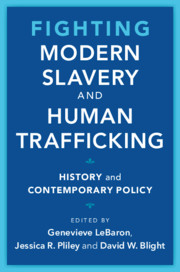Book contents
- Fighting Modern Slavery and Human Trafficking
- Slaveries since Emancipation
- Fighting Modern Slavery and Human Trafficking
- Copyright page
- Contents
- Figures
- Tables
- Contributors
- Preface
- Acknowledgments
- Abbreviations
- 1 Introduction
- 2 Counting Modern Slaves
- 3 Working Analogies
- 4 Free Soil, Free Produce, Free Communities
- 5 Ambivalent Abolitionist Legacies
- 6 Mexico’s New Slavery
- 7 Undermining Labor Power
- 8 A Market in Deception? Ethically Certifying Exploitative Supply Chains
- 9 Preventing Human Trafficking
- 10 Integrated and Indivisible
- Afterword If There Is No Struggle, There Is No Progress
- Index
7 - Undermining Labor Power
The False Promise of the Industry-led Antislavery Initiatives
Published online by Cambridge University Press: 18 June 2021
- Fighting Modern Slavery and Human Trafficking
- Slaveries since Emancipation
- Fighting Modern Slavery and Human Trafficking
- Copyright page
- Contents
- Figures
- Tables
- Contributors
- Preface
- Acknowledgments
- Abbreviations
- 1 Introduction
- 2 Counting Modern Slaves
- 3 Working Analogies
- 4 Free Soil, Free Produce, Free Communities
- 5 Ambivalent Abolitionist Legacies
- 6 Mexico’s New Slavery
- 7 Undermining Labor Power
- 8 A Market in Deception? Ethically Certifying Exploitative Supply Chains
- 9 Preventing Human Trafficking
- 10 Integrated and Indivisible
- Afterword If There Is No Struggle, There Is No Progress
- Index
Summary
The past few decades have seen a sharp and persistent rise in market-based solutions to address contemporary social concerns. Recent corporate social responsibility initiatives have displayed a growing interest in efforts to combat “modern day slavery,” a social and legal category that has emerged since the introduction of global human trafficking protocols. Corporations have responded to an increased demand for ethical business practices by adopting commitments and programs that signal their dedication to improving labor rights conditions for the people who are sewing their clothes, picking their cocoa, or cleaning their hotel rooms. Building on existing research and case studies, this chapter seeks to elaborate on ways in which initiatives that purport to protect workers’ rights – which have increasingly embraced "anti-slavery" as a focal point – actively disempower the very people they seek to protect. It additionally asks how the public lauding of corporate social responsibility’s anti-slavery efforts whitewashes brand images and actually displaces efforts to enforce labor standards across supply chains. Finally, it offers an alternative approach to corporate driven supply chain management, advocating instead, an approach to reducing labor abuse in global supply chains centered in collective worker action and international labor standards.
- Type
- Chapter
- Information
- Fighting Modern Slavery and Human TraffickingHistory and Contemporary Policy, pp. 141 - 155Publisher: Cambridge University PressPrint publication year: 2021
- 1
- Cited by

